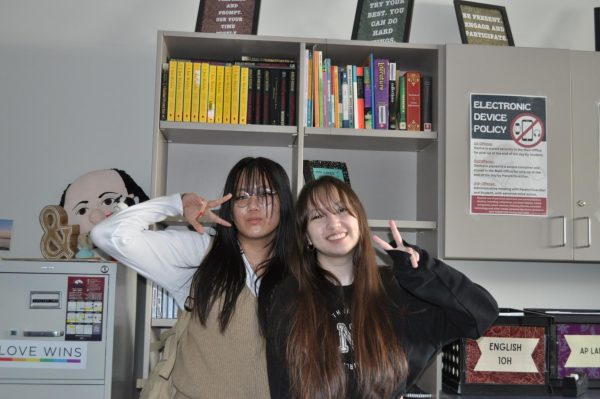6 Feet Apart: Uniting Against Crisis
Why social distancing is vital to stopping the spread of Covid-19
The world is stricken with the overwhelming numbers of the coronavirus. The global economy is deteriorating, and what we once knew as “normal life” is now unrecognizable. All nonessential travel is banned internationally and health authorities are highly recommending the rules of social distancing be followed. These safety measures include working from home instead of going into an office, closing schools and switching to online classes, and avoiding physical contact with other people but using virtual communication as an alternative. These changes that are being enforced affect everyone in society, and they are essential in stopping the impending crisis.
With the severity of the situation being considered, why are the streets still packed with traffic during rush hour and the majority of parking spaces at the grocery store still taken? Why do teenagers still get together to hang out and the more important question is: why does no one do anything to stop them?
Social distancing is not a mere suggestion. One might say that “I’m healthy, so it’s fine if I go out” or “I’m tired of staying home” in justification for going out shopping for nonessential items. The fact is, social distancing is not only in effect to prevent you from getting sick, but it is also in place to keep the virus from spreading to those at high risk.
The coronavirus spreads at an unbelievably fast rate. On March 23, 2020, New York City had identified 33,768 cases of Covid-19, according to the Covid-19 Data Working Group. On April 3, 2020, the number of cases in NYC had skyrocketed to 98,308. That is only 10 days that the coronavirus took to add 64,540 to the total of recognized cases.
To increase the gravity of the situation, these statistics only take into account one city in a world consumed by this pandemic. While 10 days is not a long time by normal standards, for coronavirus, it is a lifetime.
Covid-19 spreads quickly for multiple reasons. Isolating those people indicating symptoms of the active disease has been the plan of action so far, but new studies are showing that the virus is being carried by people who have mild to no symptoms. Furthermore, Doctor Joseph Khabbaza explains that “We know that up to 80% of Covid-19 cases exhibit mild symptoms. Symptoms sometimes may not be evident for up to two weeks.”
The reason the virus spread so quickly initially in China was because of “stealth carriers”. These carriers aided the rapid spread to the rest of the world. Given that so many carriers show little to no symptoms, it is impossible to know how many people really carry the virus, says Dr. Khabazza. This makes preventive measures all the more important.
 The ease with which Covid-19 spreads is raising major problems for the healthcare industry. The John Hopkins Medical Research elaborates: If a great number of people get sick in a matter of days, hospitals become overrun with patients. This results in a shortage of beds and medical supplies that are essential to the safety of both patients and professionals. If social distancing practices are followed, then the same number of people may fall ill, but it would be over a longer period of time, which will not overwhelm the hospital’s resources.
The ease with which Covid-19 spreads is raising major problems for the healthcare industry. The John Hopkins Medical Research elaborates: If a great number of people get sick in a matter of days, hospitals become overrun with patients. This results in a shortage of beds and medical supplies that are essential to the safety of both patients and professionals. If social distancing practices are followed, then the same number of people may fall ill, but it would be over a longer period of time, which will not overwhelm the hospital’s resources.
As the death toll for Covid-19 continues to show exponential growth, countries around the world are taking drastic steps to legally enforce social distancing. Police are enforcing the nonessential local travel ban and citizens without a justifiable reason for travel can be fined up to 2500 euros ($2,730), or even face up to 6 months in jail, the Irish Times states. While the United States is not yet using legal action to ensure social distancing, the people of America should be making every effort to stay at home.
When going out in public is necessary, safety protocols should be followed: staying a distance of 6 feet apart at all times, wearing a cloth mask over the nose and mouth, and washing hands frequently.
While staying in quarantine is difficult, it is a necessary evil. There are thousands of health care workers that put their lives at risk every day to help those infected. We can stand by them from the safety of our homes and hopefully, as fewer people are going out, the number of Covid-19 cases will drop and this pandemic will cease. Until then, social distancing is the safest solution. The coronavirus does not inherently allow normal life, so we cannot try to proceed with normal life. In an attempt to achieve a new “normal”, we can make adjustments to our daily routines by adding in more exercise, time with family, and virtual meetings with friends.
It does not take one person to stop the spread of the coronavirus, it will take millions of people united together against it. There are people who think that because the coronavirus is not infecting them or the people in their local community, they do not have to heed social distancing guidelines. It does not matter if you do not think Covid-19 can directly affect you. It is relevant all over the globe, and nearly 2 million people are victims of the virus, according to the John Hopkins Medical Research. Staying at home at least 6 feet away from people outside is the most effective way that humanity can unite against coronavirus.








